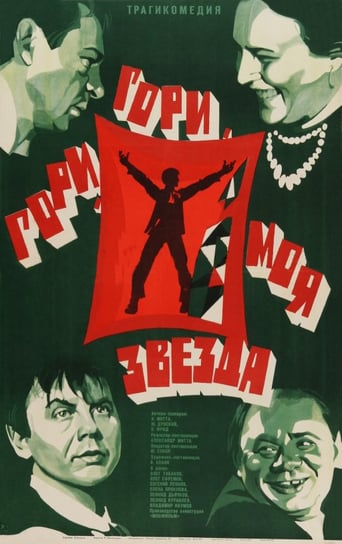hte-trasme
This film is characterized by en enormous and, I think, quite deliberate unevenness or contrast of tone. It doesn't make it an easy film to watch, but it does make it a very memorable and thought provoking one.We start with a charismatic peripatetic theatrical artiste arriving in town, competing with the local incipient cinema, and meeting a lost young girl. We are all set for this to be an inspiring, genial, comic piece about the power of the theatre as opposed to the cheapness of cinema. And for the first few acts (like a play, it marks them off as "acts"), it does that well. But this is the Russian Civil War, and the carefree, storybook-style hero is suddenly seen running up against a White Army who kill people for sport, brutalize them as a matter of course, and mentally torture them for amusement (in place, perhaps, of appreciating theater itself). There are politics to this representation, but it is no less grim. And the cruelty of the Whites in this film could really stand for the cruelty of any violent, warlike forces in history. Against this uneasy backdrop, cinema still comes off badly -- the movie theater owner is quite capable of narrating the flickering images to support either side of the war. So in that sense it's a rather pointedly and unusually anti-movies movie, as I saw it. Our hero sees theater as a medium of emotion and intellect, but either through old-fashioned singing or tawdry dance-hall numbers, it's incapable of being formed to the cruel forces of the monarchists who want to make him put on a show for them. when Vladimir wins, it is through his own power and ingenuity. And what we end up feeling is that theater is great, but alone it won't save us from wrong; we have to do that ourselves. The ending underscores that. And, in the end, it's somehow appropriate that a film about the theater should so fully encompass both comedy and tragedy. In all, this film takes a decided (and approved) political side on the history it presents, but is rather highly thought-provoking and ambiguous rather than being purely propaganda. Combined with very fine acting from the leads, this makes it very interesting, very memorable, and well worth seeing.
Kastenfrosch
This late 60s Russian films is set in 1920, just 3 years after the October revolution. Folks had the choice between red and white, revolution and contra revolution. In that torn-apart-time, one man, the comedian Wolodja, tries to mediate, not between different ideologies, but social life and art.While others just want to wash away their gloom, he reflects on the everyday sorrows and the role of art in that time of changes.Like in most Russian films, not only of that time, you have to read between the lines, to get the whole meaning. Although its basic atmosphere is quite tempered, there is a much darker, more realistic inhere. The self-ironic Russian cinema is worth a look, take this one.


